
“In one of these corners, an easel leaning against the wall catches light, displaying a monochromatic sketch on a white square sheet. Ola leans in towards the illuminated easel, about to witness the rarest event of his entire life.”
THE drapes billow at the window, letting in a gush of wind; quietly at first, and then whistling. But it seems to deepen Ola’s sleep, luring him further into a tranquil dream. The boy lay there, tucked in a cozy grey blanket. He seems aware of the activity around him, as though it is happening with his consent, as though it serves some special effect to the contents of his dream.
Again the wind comes, with a compelling surge now, throwing heavily at the curtains as they comply with loud vehement movement. The vibration in the room shakes the windows along their hinges, hitting them hard to their frames in continuous knocks. Everything in the room receives life. Ola turns on his side, chews at nothing, and carries on his sleep with new, earnest interest.
Atop a high table above his bed, an old, dog-eared book is opening, its brown, delicate leaves fluttering swiftly. And as if scared of what may have taken over the room, the lone electric bulb begins to flicker as it swings wide along its suspension from the ceiling.
Ola is woken. Grimacing, he tries his eyes open, but he can only manage a squint at the lone flickering source of light above him in the frigid room. He sits up and looks around, hugging himself. The cold now clogs his pores. He looks at the windows and sees that they are open. As he makes for the window to close it, a loud thud stops him short. Somehow, the book had hopped from the table above him unto the carpeted floor, and lies open there. Ola absently watches, still groggy.
The curtains sway even more wildly in rhythm to the wind, which pours harder into the room now, knocking more things over.
Suddenly, the bulb dies out and darkness falls. Then, almost immediately, moon rays flood in, intervening through the opening made by the wild-swaying window drapes. The moonlight makes a bright circle on the floor, every single item in the room out of place, shadows lurking like terrified ghosts in every corner. In one of these corners, an easel leaning against the wall catches light, displaying a monochromatic sketch on a white square sheet.
Ola, now clearly awake, leans in towards the illuminated easel, about to witness the rarest event of his entire life. He’d spent the better part of the night, before sleep took him, seated under some inspiration, sketching frantically. What he drew will soon take a real form in his face, claiming a right to exist in real life—a leisurely conjured figment in his head becoming a source of torment.
In an instant the sketch on the easel begins to blur out, and on the white square sheet is a mirage of a flowing flame. Then it happens; the flowing flame moving over the page gradually begins to smoulder out, transforming into a thick wisp of dark smoke that snakes up towards the room ceiling. Ola watches in awe as, right before his eyes, it takes various shapes. First the shape of something like the head of a scowling cat; and then a melting hat, and then a dark, swilling robe suspended in mid air, turning and turning. Ola stares, breathless, as a concrete figure is now taking shape, a figure looking tall. Very, very tall.
Finally floating in mid-air is a ghostly figure donning a hat he obviously has overgrown. Rustic and slim, he makes a face that leaves Ola unsure of what to feel, whether dread or to be sorry. Slowly, the figure descends, its feet steadily reaching for the floor, its cadaverous face staring at Ola.
Ola’s guest, though strangely looking, is not entirely strange. Ola, in his paintings, has created him. It was he who gave him the undersized hat; it was he who wore him the grim face, his dark, hideous robe with only a button at the neck; the torn shorts that only make more noticeable his long, thin legs. It was Ola who also gave him a name: Guffi.
Tonight, however, real life seems to have given Guffi an effect very awful.
Ola can feel fear creeping in his heart. He dashes out of bed, scrambles for the door, half expecting to be followed. He reaches for the door knob, twists and shoves hard. The door stands stiff.
He persists, but the door will not give way. There is no escaping; he must confront now the devil he created. Ola stands still, props himself against the door, his back to the room and his face buried in his palms. Whatever it is this monster wants, he doesn’t want a part in it. His fear has not let him take a proper regard of his guest, and though there is something terrifying about Guffi, something beyond what might have been his art, Ola begins to realise he knew him to the littlest detail.
Guffi approaches. Ola decides he won’t turn. He prays and hopes for salvation, any form of intervention, perhaps a knock on the door from outside, or a blow that may wake him from this nightmare. But nothing, only his heart throbs loudly in his ears, and the wall-clock ticks lousily away. When Ola feels engulfing warmth around him, he knows Guffi is very close behind him.
“What do you want from me?” Guffi’s voice is a sob, a low wind sweeping through a bamboo plantation.
Ola is stunned at the question. He is not sure he heard well.
Guffi asks again, sternly now, “What do you want from me?”
“I. . . I don’t know.” Ola hasn’t yet found the courage to turn.
“You trapped me in that thing for days,” Guffi says, pointing towards the shadow where the easel leaned. “And you say you don’t know?”
“I have no idea what you’re talking about.”
“Oh! You don’t?” Guffi stretches his own arm, scrawny and rough, and studies it with disgust. “Look at me,” he said. “So ugly even you can’t stand me.”
Ola falls to his knees and turns slowly. The room opens out behind Guffi in the mild darkness. A portion of the floor, fortunate to have received moonlight, throws off pale illumination around the rest of the room. His eyes meet Guffi’s, which glow in the dimness with twinkling brilliance. Ola looks like he swallowed a toad.
“Is this the best you can come up with?”
Ola wants return to sleep and send Guffi off to a place in his dream where he will be unable to find his way back to real life.
He closes his eyes.
WHEN Ola opens his eyes two women are standing, watching him at the door with concern. Only one of them is familiar. The unfamiliar woman, her hair cut low, quite pretty, smartly dressed and bespectacled, turns to the other woman who is rather casually dressed and seems more at home, and says, “Mrs Idowu, since when have you noticed this behaviour in your son?”
“Nine weeks, doctor.”
“Madam, your son might be showing signs of schizophrenia.”
“What is that?”
The doctor glances from Ola, who looks frozen in a tilting posture, to his mother with a desire to be understood. “Schizophrenia,” she starts to say, “is a mental condition that affects behaviour, thinking, and emotion. People with this condition usually hallucinate, have beliefs not based on reality, and have muddled thoughts. They often cannot distinguish their own thoughts and ideas from reality.”
The woman breaks down. “Is my son going crazy?”
The doctor helps her to a chair close by. “Absolutely not, Madam.”
**************
About the Author:
 Chris Tilewa is a young Yoruba who writes. A reader, lover of music and everything beautiful. He writes presently from Nigeria.
Chris Tilewa is a young Yoruba who writes. A reader, lover of music and everything beautiful. He writes presently from Nigeria.
*****
Post image by Bura Bari Nwilo.


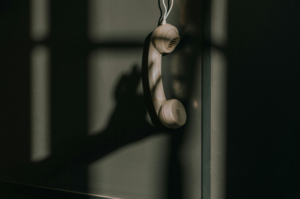
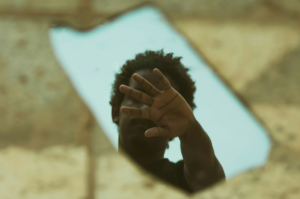

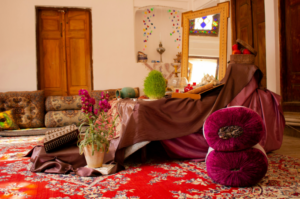
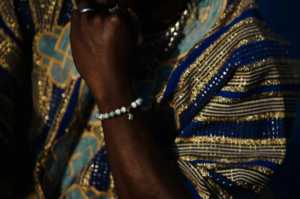
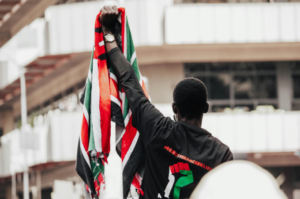

Malam M.T.Danladi April 01, 2017 16:12
An enthralling story. Promising creativity. The story is like an excerpt from Bessie Head's 'A Question of Power'